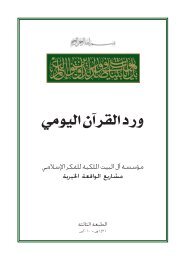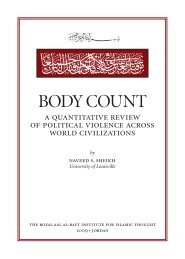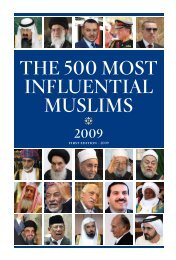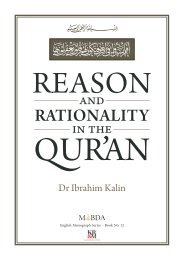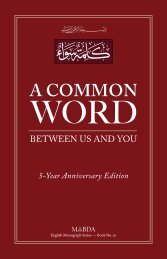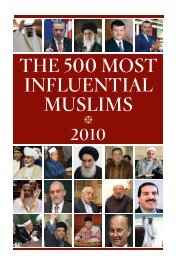Al-W¥^idÏ's Asb¥b al-Nuz‰l - The Royal Islamic Strategic Studies ...
Al-W¥^idÏ's Asb¥b al-Nuz‰l - The Royal Islamic Strategic Studies ...
Al-W¥^idÏ's Asb¥b al-Nuz‰l - The Royal Islamic Strategic Studies ...
Create successful ePaper yourself
Turn your PDF publications into a flip-book with our unique Google optimized e-Paper software.
Chapter 2: Surah <strong>al</strong>-Baqarah<br />
ex<strong>al</strong>ted is He, therefore reve<strong>al</strong>ed (And follow that which the devils f<strong>al</strong>sely related against the kingdom of<br />
Solomon) up to His saying (therefore disbelieve not) [2:102]”. 19<br />
Said <strong>al</strong>-Sudd: “People in Solomon’s time wrote magic from each other and devoted themselves to learning<br />
it. Solomon took <strong>al</strong>l that which was written of magic, put it in a chest and buried it under his throne<br />
after he warned them against it. When Solomon died and <strong>al</strong>l those who knew the incident of burying<br />
these writings then passed away after him, a devil appeared in the shape of a human and went to a group<br />
among the Children of Israel. He said to them: ‘Sh<strong>al</strong>l I direct you to an inexhaustible treasure’ When<br />
they answered in the affirmative, he said: ‘Dig under the throne [of Solomon]’. When they did, they<br />
found those writings. Upon unearthing them, the devil said: ‘It is by means of these that Solomon controlled<br />
the jinn, humans, devils and birds’. <strong>The</strong> children of Israel used those writings from then on, and<br />
it is for this reason that one finds magic more widespread among the Jews. <strong>Al</strong>lah, gloried and ex<strong>al</strong>ted is<br />
He, absolved Solomon of this deed and reve<strong>al</strong>ed this verse”.<br />
(O ye who believe, say not (unto the Prophet): “Listen to us” [ra‘ina] 20 …) [2:104].<br />
Said Ibn ‘Abbas according to the narration of ‘Ata’: “This is because the Arabs used to employ this expression<br />
[ra‘ina], so when the Jews heard them using it with the Prophet, <strong>Al</strong>lah bless him and give him peace,<br />
they liked it. This same expression in the parlance of the Jews had the connotation of vile abusive language.<br />
<strong>The</strong>y said: ‘Before, we used to abuse Muhammad secretly. Now, you can abuse him openly because<br />
this expression is used in their speech’. <strong>The</strong>refore, they used to come to <strong>Al</strong>lah’s Prophet, <strong>Al</strong>lah bless him<br />
and give him peace, and say: ‘O Muhammad! ra‘ina’, and the they would laugh. A man from the Helpers<br />
— Sa‘d ibn ‘Ubadah 21 who understood well the language of the Jews — understood the reason. He said to<br />
them: ‘O enemies of <strong>Al</strong>lah! May <strong>Al</strong>lah’s curse be on you. By Him in Whose Hand is Muhammad’s soul,<br />
I will cut the head of any man of you who utters this expression’. <strong>The</strong>y objected, saying: ‘But do you not<br />
use the same expression with him’ And therefore <strong>Al</strong>lah, ex<strong>al</strong>ted is He, reve<strong>al</strong>ed: (O ye who believe, say<br />
not (unto the Prophet): “Listen to us” [ra‘ina]) but say “Look upon us” [unzurna]…).<br />
(Neither those who disbelieve among the people of the Scripture nor the idolaters love…) [2:105].<br />
<strong>The</strong> commentators of the Qur’an said: “Whenever the Muslims said to their <strong>al</strong>lies from amongst the Jews:<br />
‘Believe in Muhammad!’ <strong>The</strong>y would say: ‘This to which you are inviting us is not better than what we<br />
have; we only wish it was better’. <strong>Al</strong>lah, ex<strong>al</strong>ted is He, reve<strong>al</strong>ed this verse to give them the lie”.<br />
(Nothing of our revelation (even a single verse) do we abrogate or cause be forgotten, but we bring<br />
(in place) one better or the like thereof) [2:106].<br />
<strong>The</strong> commentators of the Qur’an said: “<strong>The</strong> idolaters said: ‘Do you not see that Muhammad commands<br />
his Companions with something and then forbids them from the same and commands them to the exact<br />
opposite. One day he says something and the following day he retracts it. This Qur’an is nothing but<br />
the speech of Muhammad who has invented it. It is a speech that contradicts itself ’. <strong>Al</strong>lah, ex<strong>al</strong>ted is He,<br />
therefore reve<strong>al</strong>ed this verse (And when We put a revelation in place of (another)…) [16:101] and <strong>al</strong>so<br />
(Nothing of our revelation (even a single verse) do we abrogate or cause be forgotten, but we bring (in place)<br />
one better or the like thereof…)”.<br />
19<br />
Durr, :234.<br />
20<br />
Cf. Ayoub, pp. 137-138.<br />
21<br />
According to Qurtubi (:57), this man was Sa‘d ibn Mu‘adh.<br />
13




